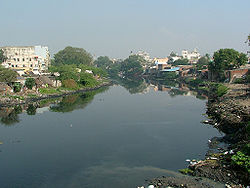Cooum
| Coovum (Coovum கூவம்) |
|
| River | |
|
Cooum River in Chennai.
|
|
| Country | India |
|---|---|
| State | Tamil Nadu |
| City | Chennai (Madras) |
| Source | |
| - location | Cooum village, Thiruvallur, Tamil Nadu, India |
| Mouth | Cooum delta |
| - elevation | 0 ft (0 m) |
| Length | 40 mi (64 km) |
Coordinates: 13°04′05″N 80°17′09″E / 13.068107°N 80.28585°E
The Cooum River (Tamil language:Tamil-கூவம் ஆறு) is the shortest classified river draining into the Bay of Bengal. This river is about 72 km in length, flowing 32 km in the Urban part and the rest in rural part. The river is highly polluted in the urban area (Chennai). Along with the Adyar River running parallel to the south, the river trifurcates the city and separates Northern Chennai from Central Chennai.
Its source is in a place by the same name 'Cooum' or 'Koovam' in Tiruvallur district adjoining Chennai district.
The classification of Unpolluted Vs Polluted Part:
Polluted Part: Paruthipattu Anaikat to the River Mouth in Bay of Bengal. Unpolluted Part: The Origin in the Cooum Village to Paruthipattu Anaikat.
In Chennai district, the river flows through three corporation zones—Kilpauk, Nungambakkam and Triplicane—for a total length of 16 kilometres (10 mi).
Owing to intensive use of surface water upstream for agriculture, indiscriminate pumping of groundwater leading to reduced base flow in the river, formation of sand bar at the mouth of the river, discharge of untreated sewage and industrial effluents and encroachment along the banks, the river, especially the downstream, has been highly polluted.
The Cooum was earlier known as the Triplicane river. The name of Cooum appears to be derived from Tamil literature. The name may have been derived from the Tamil term coopam meaning 'well' or 'deep pit'. The word coovalan denotes a person who is well versed in the science of ground water, well water and stagnant water.
Once this river was said to have its origin in Dharmapuri district, but now due to some earth table changes, it has shortened its course to Thiruvallur district. Ancient documents from the nearby temples states about one 'reaching salvation' on having a dip in the Cooum. The Cooum river was then clean and unpolluted.
...
Wikipedia

